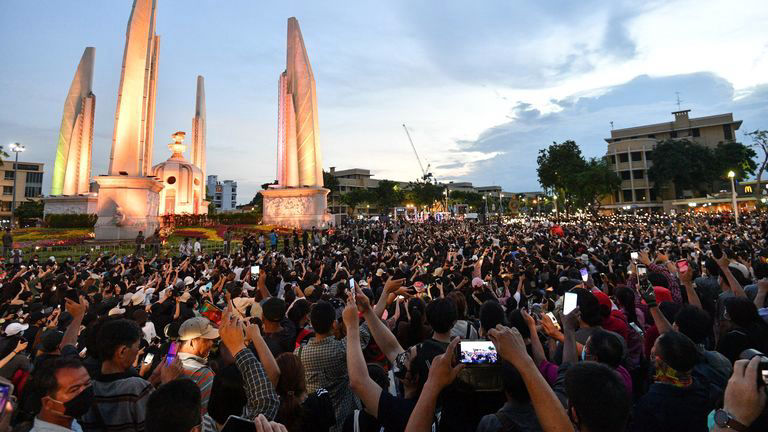
Army movements, political tension and a large scheduled student rally have sparked rumours of a possible coup.
BANGKOK-
14/09/2020
RUMOURS SPARKED OF POSSIBLE COUP D' ETAT
Army movements, political tension and a large controversial student rally scheduled for Saturday the 19th September have sparked rumours of a possible coup d'etat.
It comes as the country’s government finds itself battling the pandemic, a severe economic slump and rising political tensions.
The last two coups in Thailand in 2006 and 2014 damaged the country economically as they caused Thailand to be isolated and lose valuable ground in trade talks and negotiations which to this day, putting the pandemic and the draconian policy of sealing off the kingdom from foreign tourism aside, had already left the kingdom at a disadvantage.
Thailand has seen no less than twenty-two coups since a bloodless revolution in the kingdom in 1932 transformed it into a constitutional monarchy.
Thirteen of the coups have been successful while nine have failed.
Heightened tension and frenzied rumours have been sparked by what has been played down this week as routine army movements at a time when a large student rally is scheduled for Saturday the 19th September.
The students cause led by key student Parit Chiwarak, also known as the ‘Penguin’, demands the Prime Minister, Prayut Chan ocha, to resign and make way for an external figure to be put into power for a two-year technocratic government to guide the kingdom through an extensive and open charter rewriting process, a period of economic recovery and active efforts at reconciliation. a move provided for by the current 2017 constitution.
Students have been refused permission to use the Thammasat University campus after a controversial protest there on August 10th when rally speakers called for reform of Thailand’s monarchy.
The ‘Penguin’, vowed to defy management at the university and stage the latest rally at the venue.
It is also understood that an alternative plan, being mooted by students, is to use Sanam Luang, an open space in front of the Grand Palace in central Bangkok. This may be equally problematic for authorities.
The anti-government protests started on July 18 before spreading into several provinces, particularly at school and university campuses and have since expanded beyond students to include a wide cross-section of the population.

Above; Student protest at Democracy Monument, Bangkok August 2020.
The last coups of 2006 and 2014 damaged Thailand’s economic development through its inability to sign and progress free trade deals and pacts with other countries, worldwide. In turn they drove Thailand to become more closely aligned with communist China which does not place an emphasis on human rights and democracy.
This has begun to impact the kingdom adversely since the United States ratcheted up its trade campaign against Thailand’s northern neighbour, long seen by some Thai leaders as an unstoppable economic force.
The two coups also undermined investor confidence in Thailand which had been greatly enhanced by the landslide reelection of Thaksin Shinawatra as prime minister in February 2004.
It appeared to the world at the time that democracy was finally working in Thailand.
The most recent coups in 2006 and 2014 were a response to divisive street protests which were deemed to have undermined the elected governments in 2006 of Thaksin Shinawatra and in 2014, that of his sister, Yingluck Shinawatra.
In both instances, the army, through its intervention, sought to bring back stability and order.
Reports of a coup appear to have started from an announcement by the army on August 28th that there would be troop and military vehicle movements in key provinces including Bangkok, Phitsanulok, Lopburi, Chiang Mai, Roi Et, Ubon Ratchathani and Kanchanaburi.
However Thailand’s outgoing army leader, General Apirat Kongsompong, quashed reports circulating online of a possible army coup d’état and promised that such an event was unlikely ever to occur again in Thailand.
Army General Nattapon Srisawad, who works closely with General Prayut within the Centre for Covid 19 Situation Administration, later clarified details regarding the troop movements and exercises.
He also proposed that army commanders should take greater care at explaining such moves to the public to avoid panic or anxiety. Such an instruction was also issued by General Apirat.
Reach thousands of readers on Koh Samui and beyond with Menzzoo Classifieds.